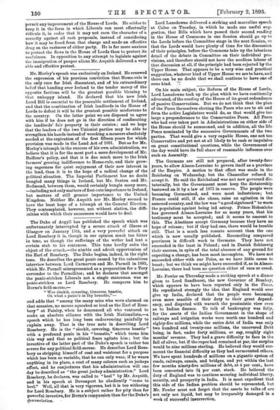Mr. Morley's speech was exclusively on Ireland. He renewed the
expression of his previous conviction that Home-rule is the only cure for Irish discontent, and of his extraordinary belief that handing over Ireland to the tender mercy of the opposite factions will be the greatest possible blessing to that unhappy island. He declared that his new Irish Land Bill is essential to the peaceable settlement of Ireland, and that the combination of Irish landlords in the House of Lords to defeat it will be the greatest possible misfortune to the country. On the latter point we are disposed to agree with him if he does not go in the direction of confiscating the landlords' fair property in their estates ; and we hope that the leaders of the two Unionist parties may be able to strengthen his hands instead of wrecking a measure absolutely needed at the expiration of the first fifteen years for which provision was made in the Land Act of 1881. But as for Mr. Morley's triumph in the success of his own administration, we believe that it is for the most part a mere development of Mr. Balfour's policy, and that it is due much more to the Irish farmers' growing indifference to Home-rule, and their grow- ing eagerness for quiet enjoyment of their new interest in the land, than it is to the hope of a radical change of the political situation. The Imperial Parliament has no doubt bungled many things in Ireland, but Mr. Sexton and Mr. Redmond, between them, would certainly bungle many more, —including not only matters of first-rate importance to Ireland, but matters of still greater importance to the United Kingdom. Neither Mr. Asquith nor Mr. Morley seemed to have the least hope of a triumph at the General Election. They contemplated, however, not without elation, the diffi- =hies with which their successors would have to deal.


































 Previous page
Previous page